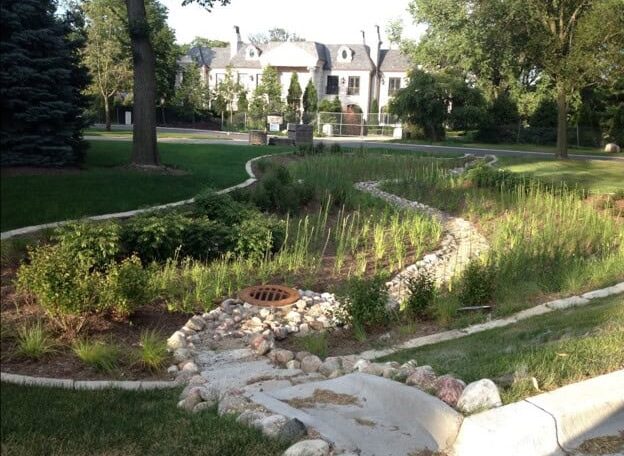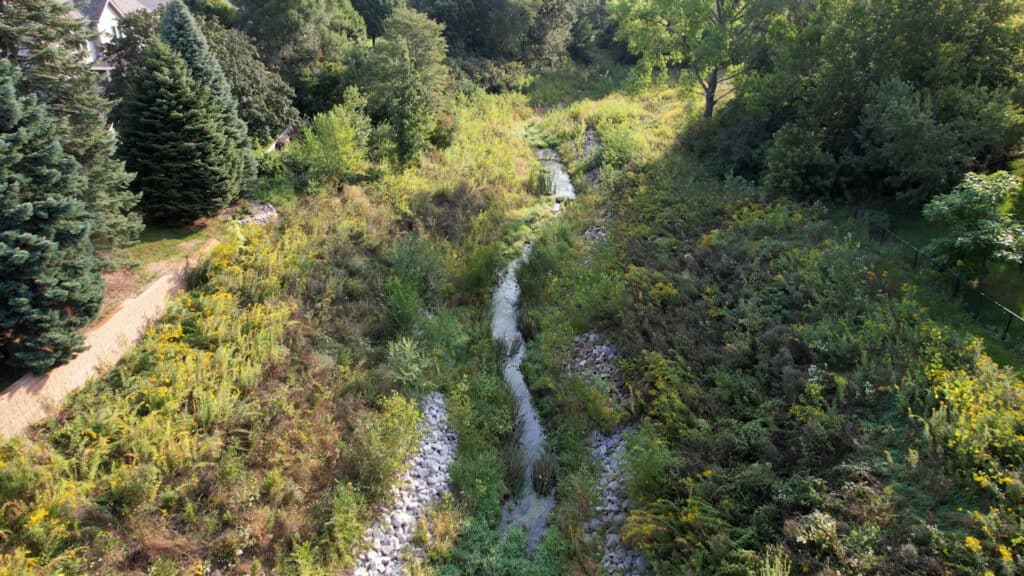- Sustainability + Resiliency
We believe that building stronger communities and improving lives begins with thoughtful, lasting action to protect what matters most. From the way we design and operate to how we collaborate and care for our people, we aim to create meaningful environmental, social, and economic impact for our clients, our communities, and our team.
HR Green’s Sustainability and Resiliency services focus on helping communities build infrastructure that functions efficiently and withstands future challenges. We guide clients in creating infrastructure that balances environmental responsibility with practical performance. By integrating resource-conscious design, energy efficiency, and long-term planning, our approach supports livable, adaptable communities.
Habitat Restoration + Biodiversity
From restoring creeks and streams by stabilizing banks and
reshaping channels to prevent erosion and improving water flow to preserving
and replanting floodplain forests, HR Green helps communities restore and
improve natural systems. Projects include rebuilding natural habitats by
creating and restoring wetlands, planting native vegetation, and maintaining
community investments in habitat and biodiversity.
Additionally, we understand the relationship of regulations and restoration to guide communities through the regulatory process and work closely with communities and resource agencies to make sure each project is well-supported and regulatory compliant.
Climate Resiliency
Adapting to changing environmental conditions and recovering from extreme weather events is a growing priority for many communities. Our disaster recovery management programs are designed to meet that need. HR Green supports these efforts by designing and improving levee systems and elevate roadways to protect against rising water levels and by implementing green infrastructure elements like permeable pavements, bioswales, and rain gardens. These solutions help manage stormwater and reduce urban flooding.
We assist municipalities with climate resiliency planning and recovery by helping assess risks, develop long-term strategies, and provide experienced staff to meet both immediate and future needs. Additionally, we also support communities in identifying, applying for, and managing grants that fund transportation improvements and enhance flood resilience including programs like FEMA’s Hazard Mitigation Grant Program (HMGP) and the BUILD grant (Better Utilizing Investments to Leverage Development .
Water Conservation (Quantity + Quality)
Sustainable water management is at the core of our work, with services that address water conservation, water reuse, sewer separation, and low-impact development for drainage. Our projects are designed to enhance both water quantity and quality using advanced treatment technologies like filtration systems and peak flow treatment, which help reduce nutrient loads and support reuse efforts. We implement systems that repurpose treated water for non-potable uses such as equipment cleaning and industrial processes, helping to reduce overall water demand.
Our team also leads sewer separation initiatives to minimize combined sewer overflows and improve wastewater system performance. In addition, we apply low-impact development (LID) strategies, such as green infrastructure and gravity-based drainage. These strategies are used to naturally manage stormwater, reduce runoff, and protect water quality while promoting environmentally responsible urban development.
Green Transportation
HR Green supports communities in creating equitable and multimodal transportation systems that serve all users. Our services prioritize transportation equity by designing infrastructure that meets the needs of diverse populations and enhances biking and pedestrian accessibility through safe, inclusive, and connected networks.
We apply Complete Streets principles to design roadways that are accessible for pedestrians, cyclists, transit riders, and drivers alike. In addition to these efforts, we help communities advance clean transportation by planning and installing EV charging infrastructure and conducting EV fleet studies to support the transition to electric vehicles.
Renewable Energy + Efficiency
HR Green helps municipalities and developers integrate renewable energy and operational efficiency into projects of all sizes. From converting organic waste at wastewater treatment plants into usable energy to designing systems that reduce environmental impact, we help communities move toward more sustainable infrastructure.
Our team also provides energy-efficient lighting designs that lower power consumption and maintenance costs while improving visibility and safety. Additionally, we conduct solar energy feasibility assessments, evaluating site conditions, energy demands, and financial considerations to determine the viability of solar installations.
Environmental + Low Impact Design
A full range of environmental services is available to support responsible development and ensure regulatory compliance. HR Green assists with NEPA (National Environmental Policy Act) compliance, preparing environmental assessments and impact statements required for federally funded projects. We also manage environmental permitting and compliance, guiding clients through local, state, and federal regulations to secure necessary approvals.
Additionally, we advance low-impact, green, and sustainable development by incorporating environmentally responsible design practices. This includes considering adding solutions such as green infrastructure, stormwater management, and energy-efficient site planning into projects that balance growth with environmental stewardship.
Green Rating Systems
Green rating systems help embed sustainability into every phase of a project, aligning outcomes with long-term environmental and operational goals. As a founding member of the Institute for Sustainable Infrastructure (ISI), the organization behind the Envision framework that promotes systemic change in the planning, design, and delivery of sustainable, resilient, and equitable civil infrastructure. HR Green’s teams utilize Envision to assess and enhance sustainability in areas such as community impact, resource use, and climate resilience.
We also support clients pursuing LEED (Leadership in Energy and Environmental Design) certification by incorporating strategies that enhance energy efficiency, water conservation, material selection, and overall environmental performance.
Featured Projects
Featured Team
Featured Insights
Community + Societal Contributions
Contact Our Team
Since 1913, HR Green has been dedicated to providing the services that our clients need to achieve success.





